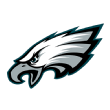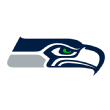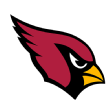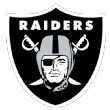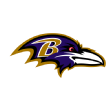Barnwell's 2019 midseason NFL awards: Picking MVP, All-Pro teams, best rookies, more

We are officially past the halfway point of the 2019 NFL season. After Sunday, teams have played 134 of the 267 games on the annual NFL calendar, which comes out to 50.2%. The last game of the first half was one of its most entertaining, with Baltimore ending New England's march toward a perfect season with a 37-20 defeat.
That game and many others from Sunday figured into my midseason awards ballot, which changed several times as the day went along and looked very different from the one I might have filed this time last week. There's really only one or two of the official categories that have a clear favorite at this point, and even that requires applying an inconsistently used rule for Offensive Player of the Year. Aaron Rodgers might have been the favorite to win the award after Week 8, buthe's no longer in the top three here after an anonymous performance against the Chargers.
Perhaps this shouldn't be a surprise in a league where 21 of 32 teams are over .500, at .500, or within one game of .500, including all of the AFC South and three of the four teams in the AFC West. Everything still feels up for grabs, and that includes just about every award. My ballot is designed to encapsulate who played best during the first half of the NFL season as opposed to who is most likely to win the award at the end of the season. I'll also include my first-half All-Pro team, which is considered under the same circumstances:
Jump to an award:
DROY | OROY | COY
CPOY | DPOY | OPOY | MVP
All-Pro teams: Offense | Defense
Comeback Player of the Year
3. Brandon Brooks, G, Philadelphia Eagles
While offensive linemen don't typically need as long to come back from Achilles injuries as running backs or wide receivers, this isn't supposed to happen. Brooks, who has excelled at guard for the Eagles since joining the team in 2016, was a major doubt to start the season after tearing his Achilles in the divisional-round loss to the Saints. Even if he did make it back early in 2019, it seemed unlikely that he would immediately regain the form that led to back-to-back Pro Bowl appearances in 2017 and 2018.
Instead, Brooks was back for training camp, and after playing 73% of the snaps in the opening week win over Washington, he has been in for every snap since. He has also gotten right back to his old level of play; the former Texans standout has posted a 94.1% pass block win rate this season, which ranks 10th among guards. Brooks has only committed one penalty all season and has been credited by Stats LLC with just one sack allowed. Brooks is right back where he belongs as one of the best offensive linemen in football. (Honorary mention here to Sheldon Rankins, who also tore his Achilles in that playoff game and returned after missing the first three weeks of the season.)
2. Cooper Kupp, WR, Los Angeles Rams
When Kupp went down with a torn ACL last season, Jared Goff's numbers dropped off across the board. After posting a passer rating of 115.4 and a Total QBR of 77.0 with Kupp on the field, those marks fell to 90.2 and 50.8, respectively, without Kupp in the lineup. Kupp's unique mix of skills allows him to serve as both a blocking threat on the backside of run plays, a safety valve for Goff in the Rams' preferred 11 personnel package, and one of the league's most devastating threats after the catch with the ball in his hands.
Goff has struggled at times this season, but you can imagine how much worse off he would be without Kupp. While Kupp's target and receiving share were pretty similar to that of fellow wideouts Brandin Cooks and Robert Woods before going down last season, Kupp has graduated into the primary role this season. He comfortably leads the team in receptions (58), targets (86), receiving yards (792) and receiving touchdowns (five). Kupp has been targeted on 30% of the routes he has run this season, which ranks second among wideouts behind Michael Thomas. Some skill-position players take a full year before they're back to their old selves after tearing an ACL. Kupp doesn't look like his pre-tear self this year. He looks better.
1. Travis Frederick, C, Dallas Cowboys
As good as Brooks and Kupp have been, though, I have to give the nod to Frederick after recovering from Guillain-Barré syndrome. There are no easy injuries to come back from, of course, but while Brooks and Kupp had familiar timelines and rehab schedules to work with in returning from their injuries, Frederick was dealing with a rare virus and a totally uncertain future. There are only a few examples of players in other sports dealing with the illness and making it back onto the field, let alone returning to their prior level of play, with former Liverpool defender Markus Babbel as the most notable example.
Frederick was arguably the best center in football before missing all of 2018 with his illness. I'm not sure he's been the best center in the league since returning from the ailment, but he's been an above-average pivot on one of the league's best lines this season, going all season without committing a single penalty. For Frederick to come back and play at a high level is incredibly brave.
Defensive Rookie of the Year
3. Devin Bush, LB, Pittsburgh Steelers
What Bush is doing as an instant starter for a defense ranked ninth in DVOA before Sunday's win over the Colts can't be underestimated. The Steelers have seemingly been drafting and developing star linebackers for decades, but they don't usually start as rookies. Since 1999, the only rookie Steelers linebackers to start seven of their first eight games in the league, as Bush has this season, are T.J. Watt and Kendrell Bell. Bell was a Pro Bowler as a rookie, and Bush might be on the same path.
Bush continues to stuff the stat sheet, although after recovering three fumbles over the first month of the season, he has only recovered one over the ensuing three games. He took that fumble to the house against the Chargers, and he added an interception of Philip Rivers in that game. Bush is tied for the league lead among rookies in interceptions with two, which is rare for an inside linebacker. More traditionally, he paces all freshmen in both tackles and solo tackles. With the Steelers relying on their defense to win games, it's difficult to imagine where they would be without their first-round pick.
2. Josh Allen, DE, Jacksonville Jaguars
Allen has flown under the radar by virtue of playing on the Jaguars amid Gardner Minshew mania, but like their fill-in quarterback, the first-round pick has made an immediate impact. Allen has seven sacks in eight games, including a pair of strip sacks. He even picked up a sack by spinning off of star Saints left tackle Terron Armstead, although it was admittedly a coverage sack.
Could you make the case that Allen is better than Nick Bosa? Maybe. Their production is relatively similar, given that Allen has seven sacks and 13 knockdowns on 371 defensive snaps, while Bosa has an identical seven sacks and 13 knockdowns on 292 snaps. The extra opportunities obviously help Allen, but Bosa has also played on a defense that has almost constantly been ahead and able to pin their ears back to go after the quarterback. Both play alongside great defensive linemen, which makes it easier to see one-on-one opportunities. According to ESPN's analysis of NFL Next Gen Stats, Allen has been double-teamed on 26.3% of his pass-rushing opportunities, slightly ahead of Bosa at 21.8%.
1. Nick Bosa, DE, San Francisco 49ers
I'll narrowly give the nod to the younger Bosa brother, who has created nine sacks with his pass rushes this season, tied for sixth in the league. Bosa has created those nine sacks on 111 pass-rushing opportunities, in contrast to Allen's seven sacks created on 147 pass-rushing reps.
The Defensive Player of the Year hype surrounding the second overall pick might be a little inflated -- he might not even be the best member of the Bosa family for that discussion -- but he has made an instant impact for the league's most-improved defense.
Offensive Rookie of the Year
3. DK Metcalf, WR, Seattle Seahawks
I was all ready to place Saints center Erik McCoy on this list after a glowing start to the season, but with McCoy hit by four holding penalties in the first half and Metcalf dragging overmatched Bucs cornerback Jamel Dean for 123 yards and a touchdown during Sunday's overtime win over Tampa Bay, I'm pushing the league's leading rookie receiver into the top three. Not bad for the ninth wideout chosen in the 2019 draft class.
While I'm generally loath to totally throw away a player's scouting report after a half-season of football, it's clear that the scaremongering surrounding Metcalf before the draft wasn't accurate. Metcalf can do more than run in a straight line. He's not limited to go or fade routes, although he's absolutely terrifying when the Seahawks get him isolated against a smaller cornerback. Metcalf is threatening teams on deep crossing routes and drag routes, where he can use his 6-foot-3 frame to create separation from opposing cornerbacks and his speed to run away from opposing linebackers after the catch. Russell Wilson's unconscious first half on deep balls has made this the perfect landing spot for Metcalf, but the rookie wideout is playing his part, too.
2. Kyler Murray, QB, Arizona Cardinals
While the preseason storylines surrounding Murray and the Air Raid seemed to suggest that they would either take the league by storm or fail miserably as gimmicks, the truth has been somewhere in the middle. Murray and the Cardinals' rushing attack has been more effective than anybody would have expected, with Arizona ranking fourth in rush offense DVOA through the first eight weeks of the season. Murray, who has 56 carries for 313 yards and two touchdowns, ranks fourth in expected points added as a runner among quarterbacks.
Strictly on pass plays, Murray ranks 17th in Total QBR at 54.7. The Cardinals aren't asking Murray to throw downfield frequently, with the former Oklahoma star averaging just 6.7 air yards per pass attempt, which ranks 28th in the league. Some of that likely owes to a lack of confidence in Arizona's pass protection. The Cardinals also haven't exactly been stocked with burners at receiver, given that Christian Kirk missed three games and Andy Isabella had barely played before his long catch-and-run against the 49ers. Murray's leading targets at receiver have otherwise been Larry Fitzgerald and KeeSean Johnson. If he can start using the threat of the running game to create big plays downfield as a passer, the Cards will hit new heights on offense.
1. Josh Jacobs, RB, Oakland Raiders
The lone rookie running back who has been an every-week starter for his team, Jacobs has flourished behind one of the league's most impressive offensive lines. Chalking Jacobs up as a product of that line wouldn't be fair, though; he has averaged 2.13 yards after first contact as a rusher, which ranks third among backs with 100 carries or more. On Sunday, he beat up and ran over the Lions, racking up 120 yards, two touchdowns and seven first downs on 28 carries.
Jacobs ranks sixth in the league in rushing yards through eight games, combining significant volume with slightly above-average efficiency as measured by tools like Success Rate. You might hope he contributes more as a receiver, given that he has 11 catches for 102 yards so far, but there's no perfect rookie this season. As the focal point of an underrated Raiders offense, though, Jacobs has done enough to finish first at the halfway point.
Coach of the Year
3. Sean Payton, New Orleans Saints
In a year wherethis award could easily go to one of eight or nine coaches, there's no right order for the candidates here. I'm not going to name guys like Sean McDermott, Andy Reid or Ron Rivera, each of whom wouldn't be remotely offensive as the winners after nine weeks. This award typically goes to new coaches who drive single-season turnarounds; the obvious option there is Green Bay's Matt LaFleur, who dropped into fourth after Sunday's curious loss to the Chargers.
Coaches who have been consistently great for years like Payton rarely get consideration for this award, but 2019 might qualify as an exception. Payton's Saints hit the bye at 7-1, which included a 5-0 record with Teddy Bridgewater while Drew Brees was out with a thumb injury. Bridgewater is one of the better backups in the league on paper, of course, but the Saints comfortably beat teams like the Seahawks, Cowboys and Bearswhen they were supposed to struggle.
The only hole I would poke in that argument is that the offense wasn't the driving force in those victories. During that 5-0 run, the Saints ranked ninth in Win Probability Added on offense, a testament to what Payton and Bridgewater were able to do with Michael Thomas and a great offensive line. It's also notable that Dennis Allen's defense ranked third in Win Probability Added over that time frame, trailing only the Patriots and 49ers. I'd be more likely to pick Allen for Coordinator of the Year than I would be to pick Payton for Coach of the Year, although both deserve serious consideration.
2. Bill Belichick, New England Patriots
Belichick dropped out of the top spot in the Coach of the Year rankings after Sunday night's loss to the Ravens, where his previously dominant defense was gashed for 372 yards and 31 offensive points by Lamar Jackson& Co. One disappointing game doesn't knock the Patriots out of the discussion for the greatest defense ever -- just to make a comparison to a legendary defense from the past, the 2000 Ravens allowed 38 points to the Jaguars in Week 2 -- but it does lend credence to people who suggested their dominant early performances were significantly influenced by subpar opposition.
I was surprised to see Belichick approach the Ravens game in such a conservative way on offense. With the Patriots down 17-0 in the first half, Belichick decided to punt on fourth-and-1 from his own 40, only to be bailed out when former Pats corner Cyrus Jones muffed the punt and gave the ball to New England. The Pats then punted again on fourth-and-9 from the Baltimore 37-yard line, only to catch another break when they recovered a Mark Ingram fumble. At the end of the half, with legendary sneak king Tom Brady, the Pats decided to kick a field goal to make it 17-13 in lieu of attempting to convert a fourth-and-goal from the 1-yard line.
Belichick's game plan went well when the Ravens were turning the ball over, but the plan fizzled out once the fumbles stopped going the Pats' way. After halftime, the Ravens returned a Julian Edelman fumble for a 70-yard touchdown. On their next offensive drive, with a 23-20 lead, John Harbaugh decided to go for it on fourth-and-4 and converted with a pass to Willie Snead. They scored a touchdown five plays later and never looked back. Belichick is a genius, and it's possible that he simply didn't have much faith in his offensive line in short-yardage, but Harbaugh outmanaged him Sunday.
1. Kyle Shanahan, San Francisco 49ers
After two difficult years of rebuilding the San Francisco roster and dealing with an injury to Jimmy Garoppolo, Shanahan and general manager John Lynch have seen their plan come together masterfully in 2019. The 8-0 49ers are beating teams up at the line of scrimmage on both sides of the football. You can argue that they've been more dominant than the Patriots; the Niners have trailed for a total of just under 17 minutes in the second half this season, and not once since their Week 3 victory over the Steelers.
The 49ers have been healthier on the defensive side of the ball than they were a year ago, but it's scary to think that they're doing this with a severely compromised offense. While Garoppolo has been healthy after missing most of 2018 with a torn ACL, the 49ers are down both of their starting tackles, fullback Kyle Juszczyk, running back Jerick McKinnon, and wideouts Trent Taylor and Jalen Hurd. It hasn't mattered.
As with Payton, you could make the argument that the start might be less about Shanahan and more about Robert Saleh's defense, given that the 49ers rank 13th in Win Probability Added on offense and second on defense. Maybe it's too simplistic to just give the award to the coach of the one undefeated team left in the league. Given that the 49ers were 1-7 this time last season, I'm willing to keep things simple.
Offensive Player of the Year
I'm going to follow the voter model of using the OPOY vote to focus on offensive players who aren't quarterbacks. It seems silly to award MVP to an offensive player and then say he isn't the best offensive player, but it will let us talk about more players here.
3. George Kittle, TE, San Francisco 49ers
For all the injuries the 49ers are dealing with on offense, Kittle -- even more so than Garoppolo -- is the lone irreplaceable player Shanahan has on that side of the ball. You already know about what he can do after the catch with the ball in his hands, even if his fantasy numbers have been deflated thanks to touchdowns taken away via penalties or catches coming up just short of the goal line. Kittle has been targeted on an even one-third of the routes he has run and has caught a pass on 26.4% of those routes, with the latter figure ranking first among all pass-catchers.
Where Kittle has really shined during the first half, though, is as a blocker. If he's not quite at the Rob Gronkowski level, he's not far off. There are new Kittle blocks to fawn over on Twitter every week, and as the 49ers have lost Juszczyk and both of their tackles, Kittle's work in the running game has become even more important. The 49ers average more than a half-yard per carry more with Kittle on the field. His versatility makes him absolutely essential.
2. Michael Thomas, WR, New Orleans Saints
It's easy to make the case that Thomas has been the best wide receiver in football, and that's even without considering that his starting quarterback has missed the better part of six games. Thomas' consistency has been remarkable; he has at least 89 receiving yards in seven of his eight games this season.
Where Thomas has truly stood out during his time as an elite receiver, though, is in catch rate. Thomas caught 85% of the passes thrown in his direction last season, which is just unreal for a No. 1 wideout; to put that in context, going back to 2001, no receiver with 100 or more targets in a season had previously topped a catch rate of 79%. He obviously deserved some of the credit for those numbers, but I think plenty of the credit also went to Brees.
Well, with Brees missing for most of 2019, Thomas has posted a catch rate of ... 82%. That's tops in the league among qualifying wideouts, narrowly ahead of Seattle star Tyler Lockett. Thomas is yet to drop a pass in 2019 despite leading the league in targets per game at 11.1. He has essentially been a vacuum at wideout since the start of 2018, regardless of who has been at quarterback. He's doing it without another above-average threat on this team at wide receiver or tight end. With all due respect to guys like DeAndre Hopkins and Julio Jones, Thomas is the best wide receiver in football.
1. Christian McCaffrey, RB, Carolina Panthers
While he isn't quite dominant enough to justify MVP consideration over the league's top quarterbacks, McCaffrey is comfortably ahead of the pack at running back as the focal point of the Carolina offense. After shredding the Titans for 166 yards from scrimmage and three touchdowns on Sunday, the Stanford product leads the league in both yards from scrimmage (1,244) and touchdowns (13). Dalvin Cook is the only other player within 100 yards from scrimmage of McCaffrey, and he has already played nine games to McCaffrey's eight.
McCaffrey ranks seventh in league history for most yards from scrimmage through the first eight games of a season, just ahead of Adrian Peterson's 2007 campaign. The guys ahead of him include Hall of Famers such as Jim Brown, Marshall Faulk and Terrell Davis. Those seven seasons, when prorated to 16 games, averaged 2,408 yards from scrimmage and 22 touchdowns. McCaffrey is not quite 100% healthy -- he was on the injury report with a knee issue and was briefly evaluated for a concussion on Sunday -- but he's on pace for 2,488 yards from scrimmage and 26 touchdowns.
Would that be enough to engender serious MVP consideration down the line? I'm not sure. McCaffrey would come up 21 yards short of Chris Johnson's record season of 2,509 yards from scrimmage, but when Johnson set that mark for an 8-8 Titans team in 2008, he didn't receive any MVP attention. The touchdown total seems more likely to attract attention, given that players like Shaun Alexander and LaDainian Tomlinson were able to win 21st century MVP awards with gaudy touchdown marks. If McCaffrey can make it to 30 touchdowns and pushes the Panthers into the playoffs without Cam Newton, he's going to be in the discussion.
One reason to think he might actually have a shot at getting to 30 scores? McCaffrey doesn't have to play the Bucs again. With Vita Vea emerging as an elite run defender, Tampa has led the league in rush defense DVOA and been the only team capable of shutting down CMC. In his two games against Tampa, he has carried the ball 38 times for just 68 yards to go along with six catches for 42 yards. McCaffrey is averaging 55 yards from scrimmage and one touchdown per game against the Bucs, but then 189 yards from scrimmage and 1.8 touchdowns per game against the rest of the NFL.
Defensive Player of the Year
3. Aaron Donald, DT, Los Angeles Rams
No, this isn't a hyped season for the defending two-time Defensive Player of the Year, who has a relatively modest nine quarterback knockdowns through eight games for the Rams. The Rams have struggled in the secondary, and without a dominant edge rusher, he has seen a steady stream of double-teams on the interior. According to ESPN's analysis of NFL Next Gen Stats, only Kenny Clark has been double-teamed more often than Donald so far. It's nothing new for the superstar Rams defensive tackle.
Even given the attention, Donald is still impacting games. He has five sacks to go with seven tackles for loss against the run, with the latter figure leading the NFL. The Rams have allowed an 82.5 passer rating and a 42.2 QBR with Donald on the field this season, but with their superstar lineman on the sideline, those figures rise to a 130.5 passer rating and an 81.2 QBR. Don't be fooled: This is still the best interior lineman in the league.
2. Cameron Jordan, DE, New Orleans Saints
I'm not sure anybody in the league is more difficult to block when his defense needs a big play than Jordan, who has been at the same level as the likes of Khalil Mack and Von Miller over the last couple of seasons. Jordan ranks among the league leaders with eight sacks, 13 quarterback knockdowns, and five tackles for loss. He has also created 10 sacks with his pass pressure, which ranks fourth in the league behind Mack, Za'Darius Smithand Shaq Barrett. I wouldn't blame you for putting any of those guys here, but Jordan is every bit as impactful.
1. Stephon Gilmore, CB, New England Patriots
While the Patriots had their worst performance of the season Sunday night, Gilmore wasn't to blame. Assigned the duty of covering top Ravens wideout Marquise Brown for most of the evening, Gilmore held the rookie to three catches for 48 yards on four targets. The Patriots have no fear with putting Gilmore on anybody, regardless of how big or fast they are.
In return, Gilmore has delivered. According to NFL Next Gen Stats, he has allowed a passer rating of just 39.3 as the closest defender in coverage, the third-lowest mark for cornerbacks who have at least 100 snaps in coverage. He has also been targeted 55 times, so opposing offenses are desperately going at the star corner in single coverage and failing. As valuable as it is to have a corner like Raiders-era Nnamdi Asomugha who wipes away one side of the field and allows a team to focus your coverage efforts elsewhere, it's even more valuable when a player like Gilmore can both draw lots of targets and then erase those pass plays in the process.
You could make a case for other Patriots here, but when I asked ESPN Patriots reporter Mike Reiss on my podcast last week to pick a defensive MVP from this defense, he picked Gilmore. As well as the rest of the defense has played for the majority of the first half, I have to agree. Gilmore's ability unlocks quite a bit of what the Patriots are capable of doing on the defensive side of the ball. Pass-rushers almost always win this award, but until one pulls away from the pack, his nearly unquestioned status as the best cornerback in football could open the Defensive Player of the Year trophy up for a defensive back.
Most Valuable Player
3. Lamar Jackson, QB, Baltimore Ravens
The quarterbacks ranked first and second on my list belong in the top three no matter how you slice them. The competition for the third spot is far wider and looked at the likes of Aaron Rodgers and Dak Prescott as candidates. This might be considered recency bias given that the final game of Sunday evening was Baltimore beating the Patriots, but Jackson's performance against the league's best defense is enough to push him into the MVP discussion.
His raw passing numbers are ordinary, but when you combine his ability as a passer with his running statistics, he absolutely moves the needle. On 99 rush plays this season, Jackson has accrued just over 27 expected points worth of value. To put that in context, that's nearly more than the run expected points pieced together by the second- and third-ranked quarterbacks (Deshaun Watson and Daniel Jones) combined, as the two add up to nearly 29 expected points. Jackson ranks seventh in the league with 35 first downs as a runner; that's nearly as many as Leonard Fournette, who has 36, but the Jags back required 174 rush attempts to get to that total. Jackson's 35.4% first-down rate as a runner is comfortably the best in football.
As he showed on Sunday, Jackson is also a good enough passer to scare teams who sell out to stop the run. Heading into Sunday's game, the Patriots had allowed opposing quarterbacks to post a completion percentage of 52.4% against what NFL Next Gen Stats estimated as an expected completion percentage of 60.5%. Both numbers are remarkably low. Against the Ravens, though, the Pats allowed Jackson to complete 73.9% of his passes against an expected rate of 70.5%.
After posting a Total QBR of 89 against the Patriots, Jackson's 69.8 mark in Total QBR ranks fifth in the league. One of the guys ahead of him is injured Chiefs star Patrick Mahomes. Another is Prescott, who leads the league in QBR and might slip back into third place with a big game against the Giants on Monday night. Jackson's ability to hold his own as a passer, lap the field as a runner and mostly avoid big hits and giveaways make him an incredibly valuable quarterback. He's the first guy who has made the Patriots defense look bad this season.
2. Deshaun Watson, QB, Houston Texans
Nobody besides McCaffrey has a more impressive highlight reel than Watson, who seems to have one jaw-dropping, instantly-viral play per week. It feels like an eternity ago, but we've all mostly forgotten about Watson nearly beating the Saints in Week 1 by guiding his offense 75 yards on two plays for what looked to be a game-winning touchdown, only for the defense to blow the lead. That would have been a signature game for most quarterbacks, but it's buried under 15 or 20 more recent instances of Watson doing something few quarterbacks in the game can do with a casual flick of his wrist or shuffle of his feet.
While he will create pressure by extending plays and was without left tackle Laremy Tunsil for Sunday's blowout victory over the Jaguars in London, we're finally getting to see what the 2017 first-round pick can do with a bit of protection. Watson's pressure rate is down from a league-high 40.9% to 30.1% this season, and while he doesn't ever seem fazed by pressure, he's unsurprisingly better when the opposing pass rush is leaving him alone. He has posted a 111.6 passer rating and an 83.9 QBR without pressure, up from 91.3 and 47.4, respectively, when he has been pressured. Watson's sack rate has also dropped from 10.9% to 7.6%, which should keep the star quarterback healthier, although that doesn't account for the plays where he takes a hit and still manages to find a receiver for a first down.
As an aside, while I'm obviously not counting any of them against Watson, I'm the one killjoy who doesn't love those plays where Watson writhes in the grasp of an opposing defender before somehow completing a pass. I know it cost the Texans a possible touchdown when Watson was called in the grasp of Justin Houston against the Colts in Week 7, wiping away what should have been a touchdown pass. It's a thankless task for officials, who have to toe an impossible line. It's incredibly fun to see what Watson can do when he extends plays. He's also a quarterback with a pair of ACL tears in his past, and one wrong twist or late hit when he can't protect himself while looking downfield might very well create the third. I don't want Watson to get injured, and if it means the occasional premature grasp call, I would rather deal with that than have to watch AJ McCarron quarterback the Texans in a postseason game.
While they sound great on paper, Watson's actually not getting a ton of help from his receivers, who have dropped 4.6% of his passes. Only Carson Wentz (5.0%) and Prescott (5.5%) have been victimized by drops more frequently. The Texans lost Will Fuller to a hamstring injury, briefly lost Kenny Stills to a groin issue in London, and Bill O'Brien has pinned Keke Coutee to the bench for two straight games after his drop led to a game-ending interception against the Colts. Watson has responded by throwing his seven touchdown passes over the last four weeks to DeAndre Hopkins, Duke Johnsonand Darren Fells. Watson has actually posted a better passer rating this season on throws to everyone besides Hopkins (108.6) than he has on throws to him (103.8).
I can only poke the tiniest holes in Watson's game to place him second. He has thrown five interceptions in 302 pass attempts. One was a Coutee drop, and another came on a play where it appeared two receivers incorrectly ran the same route into each other. Of the other three, two were ill-advised throws, including one in the end zone against the Chiefs. A 1.6% interception rate shouldn't typically be held against quarterbacks, but this is rarified air. Watson and the offense seem to have a couple of games each year when the attack inexplicably sputters out for an entire contest, and they already had two such games in September against the Jags and Panthers.
Watson would be a great MVP pick, and with Mahomes sidelined, nobody feels more capable of the seemingly impossible on any single snap than Houston's star quarterback.
1. Russell Wilson, QB, Seattle Seahawks
There was a time when I would say that about Wilson, but it wouldn't be 2019. I'm not suggesting Wilson is incapable of pulling some magic out and scrambling forever before finding an open receiver if he needs to on a big play. I'm saying he hasn't really needed to very often this season. He looks about as under control and collected as any quarterback in football these days, like the game has slowed down several speeds. In an offense that hasn't valued him the way he deserved to be valued and with a receiving corps other quarterbacks would struggle to use well, though, Wilson has absolutely torn apart opposing defenses all season.
It's quickly gotten to the point for me where I assume a lofted Wilson throw is going to result in a catch and a big gain. With a receiving corps consisting mostly of 5-foot-10Tyler Lockett and a pair of big receivers with little agility, Wilson seems to drop in inch-perfect lobs like he's in practice. On deep passes this season, he is completing more than 50% of his throws, averaging 15.1 yards per attempt, and posting a league-best QBR of 98.5. Stretch it further to ultra-deep passes traveling 26 or more yards in the air and Wilson is still completing nearly 60% of his attempts, good for a 142.4 passer rating and a 99.9 QBR. All those marks lead the league.
NFL Next Gen Stats back up Wilson. Given that his average pass is traveling nearly 9 yards in the air, it's no surprise that the NGS model only expects Wilson to complete 60.9% of his passes. Wilson is instead completing 68.2% of his throws. Among starting quarterbacks, only Prescott has outperformed his expected completion percentage more significantly than the Seahawks star. Wilson's touchdown pass to Lockett against the Rams was the most improbable completion of the last two seasons.
One of the reasons Wilson didn't gather as much MVP consideration as he perhaps deserved in recent years was volume; with the Seahawks insisting that the running game was the cause of their offensive success, Pete Carroll and offensive coordinator Brian Schottenheimer had taken more of the workload off Wilson's shoulders. Last season, while Wilson was wildly efficient, he threw just 427 passes, an average of just under 27 per game. There's just no way to compare Wilson to someone like Mahomes when the latter passer was averaging more than 36 attempts per game last season; it would be impossible for Wilson to be efficient enough to make up the cumulative differences between the two.
While the Seahawks still have games where they seem to forget they have the best quarterback in football -- the second half of the Falcons game as a recent example -- Wilson has taken over games more frequently in 2019. Seattle correctly veered away from their running game against the Bucs and their dominant run defense on Sunday and instead let Wilson throw 43 passes. He's averaging nearly 33 pass attempts per game this season, which compares comfortably with the other quarterbacks in the MVP discussion.
The most impressive thing about Wilson's first nine games might actually be how he has avoided turnovers. He has posted a 22-1 touchdown-to-interception ratio, with the one pick coming at the hands of Marcus Peters against the Ravens. ESPN also credits Wilson with zero dropped interceptions. On top of that, though, he has only fumbled four times, losing one to the Steelers. He has only fumbled or thrown an interception on 1.3% of plays, the third-best mark in the league behind Rodgers and Bridgewater.
This isn't unprecedented territory for Wilson. Over the second half of 2015, he was neck-and-neck with Cam Newton as the best quarterback in football. Wilson actually led the league in Total QBR from Week 10 on at 81.1, averaging 8.6 yards per attempt and throwing 25 touchdown passes against just two interceptions. He looked a lot like the quarterback we've seen from the first half of 2019.
This time, Wilson has tossed in a bit of late-game flair to supplement his case. The 31-year-old now has four fourth-quarter comeback victories this season, although his defense blew their lead and forced him to launch two consecutive drives to set up what was a missed game-winning field goal attempt and a subsequent winning touchdown in overtime. In 2015, he was sharing the headlines and the credit with the Legion of Boom. This Seahawks defense ranked 22nd in DVOA before allowing the Bucs to score 34 points in the Pacific Northwest. Wilson has carried the Seahawks to 7-2. This is his team, and if Seattle keeps it up, it's going to be his MVP award, too.
Related Video
Related Topics
- SPORTS
- ESPN
- CHRISTIAN MCCAFFREY
- NEW ORLEANS-SAINTS
- CAMERON JORDAN
- STEPHON GILMORE
- JOSH JACOBS
- NEWS FANTASY
- LOS ANGELES-RAMS
- RUSSELL WILSON
- DESHAUN WATSON
- BILL BARNWELL
- NICK BOSA
- FANTASY NFL
- SAN FRANCISCO-49ERS
- NFL
- CAROLINA PANTHERS
- DAILY
- LAMAR JACKSON
- AARON DONALD
- OAKLAND RAIDERS
- SEATTLE SEAHAWKS
- NEW ENGLAND-PATRIOTS
- NEWS FOOTBALL



